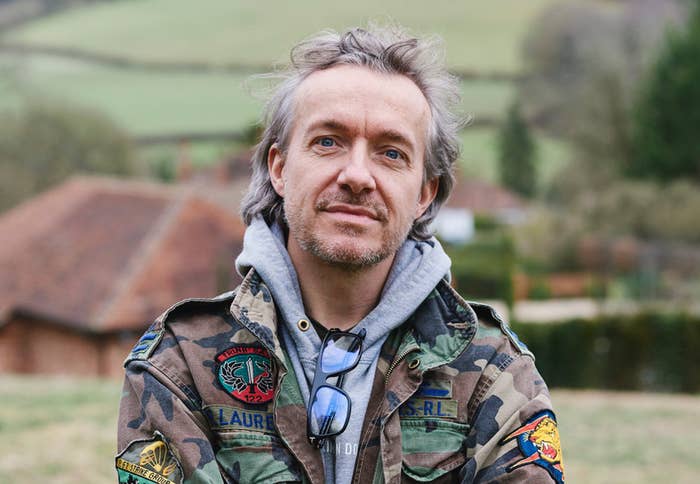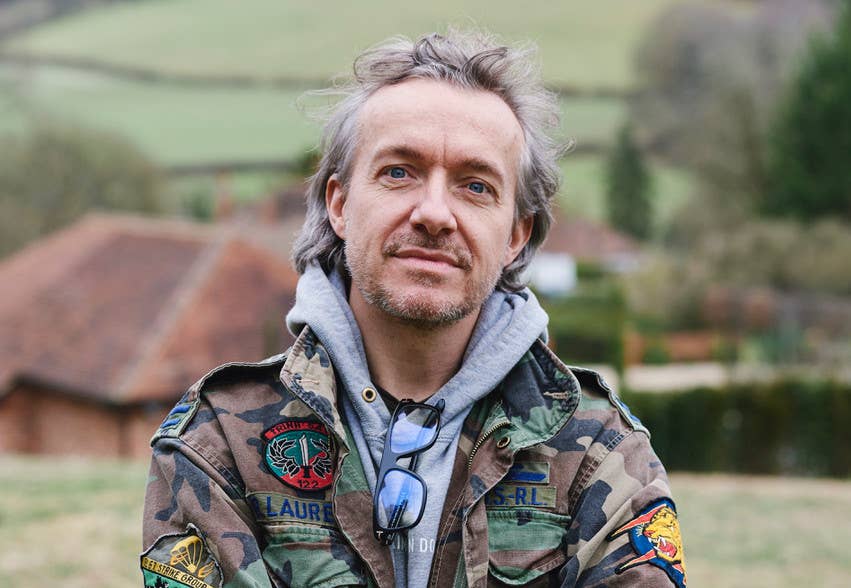
Fraser T. Smith is one of the UK’s leading producers, songwriters and composers, one that’s been involved with some of your favourite songs and albums.
Smith has worked with some of the biggest names in pop, such as Adele, Sam Smith, Florence & The Machine, but some might say his contributions to British rap and grime have been the most impactful. The Grammy and Ivor Novello-winning musician has been supporting and building a legacy within black British music for two decades now, starting out in ‘99 as a guitarist for Craig David, before going on to produce on Kano’s debut LP Home Sweet Home. More recently teaming up with Dave as co-executive producer on Psychodrama, as well as Stormzy’s Gang Signs & Prayer and Heavy Is The Head, Smith has added a certain musicality to the typically gritty sounds of the underground.
We caught up with Fraser T. Smith to discuss the importance of knowing the artists he works with on a personal level, the freedom grime gives him, plus the creative processes behind some of the country’s biggest releases.
COMPLEX: Congrats on the recent Brits win for Dave’s Psychodrama! How does it feel to be part of such an epic project?
Fraser T. Smith: Thanks! It feels incredible. But I don’t think it’s fully sunk in yet. The album’s so uncompromising, I don’t think Dave or I ever saw it as a Brits album of the year. The fact that it’s been honoured like this is a testament to just how good Dave is, but also the openness of the judges to back art over commerce. I hope it’ll inspire a whole new generation of forward-thinking artists who’ll dare to make bold records.
How was it performing alongside Dave at the show? He wasn’t afraid to call out Boris Johnson, that’s for sure.
It was magical, surreal and nerve-wracking. I’m a guitar player and this was my first ever gig on piano so I had to be super-focused. I couldn’t hear the audience, but I felt a huge wave of energy when Dave started rapping on the second verse, and it just built up from there until the end. Insane!
Before signing on as co-executive producer for Psychodrama, you worked on Dave’s earlier EP projects Six Paths and Game Over. When it came to creating the big debut, did it make it easier to plan and produce a concept?
Dave and I have a very strong, musical bond. The first song we ever worked on was “Picture Me” from the Six Paths EP: it was him sitting on the piano jamming, and me on guitar. It’s a very musical-based relationship. With Psychodrama, we would just jam for hours, with him on piano and me on bass or guitar, and really push each other musically. So when it came to the album, we felt very relaxed in each other’s company. And having done tracks on the two EPs, we were on this trajectory of Dave being a better vocalist and me helping him work on his singing and delivery, so when it came to doing the record, he was ready to create something special. And he did that.
“One of my greatest moments ever, not just because it’s an award but because it showed me the power of being authentic, was winning an Ivor Novello with Dave for ‘Question Time’.”
Psychodrama was run as a therapy session and broken down into three different acts: ‘Environment’, ‘Relationships’ and ‘Social & Moral Compass’. Was there a particular act that was harder to complete—and if so, why?
I think Dave would naturally veer towards the social aspects. I think it was harder for him to gauge with the more personal, relationship side. It was more about tracks like “Environment” going through to “Lesley”, but how to tie them in with a track like “Location” with Burna Boy and JAE5 and seeing how they would fit onto the same record—that was the main challenge. Dave was probably more challenged by a track like “Location”: it sounds like he could do that in his sleep, but he has to have the right setting and vibe for that type of track. Naturally, day in and day out, he could sit down and come up with amazing chords and very deep thoughts, but I think for him it’s almost harder doing what you would think would be the easier side and lighter type of lyrics.
Taking it back to the very start of your career, what inspired you to start making music? Did you come from a musical background, or was it something you just found yourself?
I was thinking about this recently. No one in my family was directly super-musical, except for my nan, who I remember seeing playing the piano in that very old-school, gather-around-the-piano sort of way. She used to live in Raynes Park, in South London, and I remember her playing but also seeing the joy it would give to people. When I was a very young kid, I used to play on her piano; my parents weren’t musical, but they always used to play varied music around the house—from Carole King, Fleetwood Mac even Philadelphia soul music, to Diana Ross and lots of Motown. If you’ve got an ear for music, you pick up the feeling that it gives to people. I’m always quite envious of people who are like, “My dad was a composer and my mum was a jazz pianist.’” No wonder they’re so brilliant!
When did you really start to take producing and songwriting seriously?
Well, I started off as a musician. I was playing guitar and got really into that when I was 14. I was at school with Tom Rowlands from the Chemical Brothers and he was a big inspiration to me. Tom was really into The Sisters Of Mercy and he introduced me to them; they were an electronic gothic band. But he was also into Run DMC and Public Enemy. We just used to jam—he had loads of records—and that’s when I think it got serious for me at the age of 14. I had 4-track tape machines where I’d always be recording, and from there I went into studios as a session player and recorded guitar for people. I was touring with Craig David for five years, so I was always into producing and songwriting. When I left Craig’s band, I was around 30 and then went to work with Kano and Plan B.
You worked with Kano in 2005 on his debut album, Home Sweet Home, and then in 2016 for Made In The Manor, and you’ve also worked closely with Stormzy and, of course, Dave. On the flip-side, you’ve also written and produced for the likes of Adele and Sam Smith. You could carry on creating for the biggest names in pop music, but you’ve continued to build on the grime and rap sound—why is that?
It’s the freedom with grime, and even garage before it which I was also really into. The first grime artist I ever met was Kano. We did a guitar track together that turned into “Typical Me” and, for me, it was the way that the genres could blend. What I love about it is that you can do whatever you want to do; it’s that element of freedom, coupled with the rawness of the drums and bass. People like Dave, Stormzy and Kano have lyrically taken some really serious topics and forced them into the limelight. Even if they’re really emotional topics that are close to them or bigger topics, like the political state of the country and Grenfell, it’s harping back a little bit to where Public Enemy and N.W.A were. It’s such an important genre, culturally and musically.
Stormzy’s Gang Signs & Prayer was a huge moment for grime and black British music more generally. How was it being the co-executive producer on that project?
When I first met Stormzy, he said that the concept was ‘gang signs’ and ‘prayer’. We were talking about that and, immediately the sound of the record came to me in that the ‘gang signs’ would be the beats and the harder-edged sounds, and the ‘prayer’ would be the musicality in choirs, pianos and more traditional sounds like strings. So that concept musically ran through the whole record. Stormzy, before me, had been working with some amazing producers like Sir Spyro, Mura Masa, and that gave it a little bit of the edge. For me, my experience in helping an artist is bringing lots of different sounds together and help with a narrative for the record, which is what I brought to the table. It took ten months; we were in pretty much every day, and I got to know Stormzy very well. I think you do when you’re making a record with someone. He felt very comfortable in the studio to express himself.
“People see through things that aren’t real.”
It’s been said countless times by artists that you help to shape, mentor and guide them on completely different levels when you work with them. How important is it for you to truly understand and build a relationship with the people you work with?
It’s everything. I’m older than a lot of the artists I work with and I think stewardship is really important. Especially for me being older, I want to be there as someone they can lean on, someone that can push them musically, answer questions and be there emotionally. All of those roles are very important in being a producer, especially when you’re working across a whole record. It’s a massive thing to release a whole body of work and be connected musically, and for the artist to be saying things that Dave, Stormzy and Kano do. You need to be someone that is really trusted and can push them musically, emotionally and spiritually. I take that role seriously.
For some artists, it can be difficult to open up and unlock their true potential. As a producer, composer and songwriter, what approach do you use that enables them to reach their full potential musically? Are there certain perspectives that you wish for them to look from?
Being authentic to themselves is massively important, because people see through things that aren’t real. To be real, you’ve got to feel yourself and be relaxed. The way my studio is set up, I’d say it's very unpretentious and I don’t think I come with any pretence. I definitely say to new artists that we are a team. I don’t really trade on any past successes; it’s nice to have a Grammy on my mantelpiece, but I don’t look at it every day and big myself up. You’re only as good as your last record. However new an artist might be, you definitely come to the table together—it’s about staying humble. There are certain things that I know make a record work, in terms of sonics, but also being free to experiment in a safe space. It’s important for artists to realise that you don’t have to work for 23 hours a day! If you’re spending ten months in the studio... Both Stormzy and I got into a very good rhythm from 2-9pm, which enabled him to do stuff in the morning, and he came in super focused every single day. We weren’t always working until 4 in the morning—we had fun, but we weren’t smashing tequila everyday [laughs]. The experience of having made a few records, you can help artists know the best way to work. Giving them the freedom to work in a way that they feel comfortable as well. I definitely don’t impose these kind of rules, but I suggest things that I think will be helpful.
You’ve had some huge hits in the past, but do you think there’s a certain formula behind making a hit back then to now, especially in the digital landscape we’re currently living in? Or, do you think it comes down to being authentic like you previously mentioned?
It really does come down to being authentic. I have written a lot of songs and a lot of hits, but I’ve also had a lot of misses! I’ve got a hard-drive full of songs you’ve never heard that are pretty bad. But thank you, Elle. I appreciate that.
[Laughs] It’s alright.
One of my greatest moments ever, not just because it’s an award but because it showed me the power of being authentic, was winning an Ivor Novello with Dave for “Question Time”. I had been nominated before, for songs like “Set Fire To The Rain” (Adele) and “Broken Strings” (James Morrison), that I thought were good in terms of songwriting—the type of songs you’d play to your mum and she’d be like, “Yeah, you’re a professional songwriter. That’s great!” But they never won. Me and Dave were in the category a couple of years ago and we won! I sat and thought how amazing, ironic and incredible it is that a politically-based rap song that’s seven minutes long with weird, Radiohead and James Blake-influenced chords could win a major songwriting award. It just shows that everyone’s really open to people being great and I think if you are great, you will be found out.

